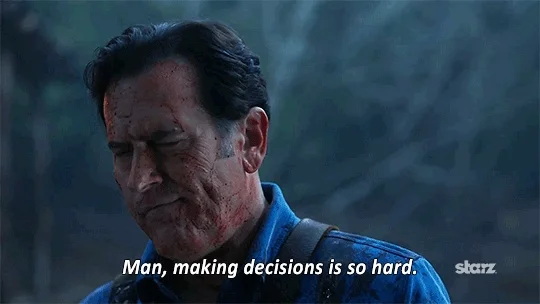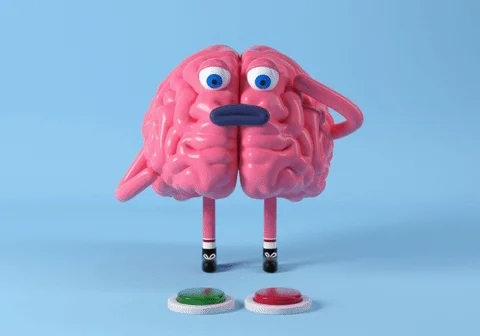
Think about how many decisions you make before lunchtime...

When to get out of bed after your alarm goes off.

What to wear.

How to style your hair.

What to eat for breakfast.

Coffee or tea?

What to listen to on your way to work or school?
The list goes on.
Although these decisions seem trivial, all the decisions we make in a day add up over time and can eventually lead to a phenomenon known as "decision fatigue".
There are a variety of options you can take to help manage your decision fatigue.
What is Decision Fatigue?
Just as your muscles fatigue after you exert them with exercise, your internal cognitive resources deplete each time you process information to make a decision. The term "cognitive" or"'cognition" refers to the mental processes that happen in your brain such as attention, thinking, memory, and recall.
Decision fatigue is when people have difficulty making decisions and controlling their behavior after "repeated acts of decision-making." Itcomplicates your ability to make effective decisions and can even prevent you from making any decisions at all.

Signs of Decision Fatigue
The first step in managing decision fatigue is recognizing when it's happening.
5 signs of decision fatigue:
Trouble focusing or concentrating — you get quickly sidetracked by other tasks.
Procrastination — you avoid making the decision for as long as possible.
Feeling overwhelmed and stressed —you feel weighed down by decisions, responsibilities, or tasks.
Impulsive behavior —you make an impulse purchase in a hasty decision.
Exhaustion — you feel brain fog or are extra tired.

Options for Managing Decision Fatigue
There are several choices you can make to reduce your likelihood of reaching decision fatigue:
1. Prioritize your decisions
Identify the most important decisions you need to make and focus on those first. This can ensure you conserve mental energy for the decisions that really matter.
For example, create a to-do list and circle the items that require decisions. Start working on the tasks you circled first.
 Photo by Paico Oficial on Unsplash
Photo by Paico Oficial on Unsplash2. Automate routine decisions
Automating routine decisions, such as what to wear or what to eat for breakfast, can reduce decision fatigue.
For example, you could try meal prepping your lunches for the week to avoid deciding what to eat each day.
 Photo by Ella Olsson on Unsplash
Photo by Ella Olsson on Unsplash3. Limit your options
Too many options can be overwhelming. Reducing your choices will conserve mental energy by limiting the number of decisions you have to make.
Many prominent leaders and entrepreneurs combat decision fatigue by wearing the same thing every day. For example, Barack Obama only wears gray or blue suits and Steve Jobs famously wore a black turtleneck with jeans.
 Photo by abillion on Unsplash
Photo by abillion on Unsplash4. Take breaks
Taking regular breaks throughout the day can help refresh your mind and recharge your mental batteries.
For example, can you take a walk around the block or catch up with a friend over coffee when you're feeling an afternoon slump?
 Photo by Mindspace Studio on Unsplash
Photo by Mindspace Studio on Unsplash5. Get enough sleep
Getting enough rest is critical for maintaining mental and physical health. A lack of adequate sleep can contribute to feelings of burnout and decision fatigue.
Check out this Byte on how to improve your sleep hygiene.
6. Delegate some decisions to others
Ask others to make decisions for small or non-critical matters. Having someone else make the decision for you can preserve your mental energy.
For example, can you alternate with your partner who decides what to watch or where to eat for date night?
 Photo by Jonas Leupe on Unsplash
Photo by Jonas Leupe on UnsplashQuiz: What should Jerry do?
Jerry is a server at a popular restaurant. Nearing the end of a busy Friday night shift, Jerry's last table asked him to recommend his favorite appetizers and entrees. Jerry's brain is fried and he struggles to think of the best dishes to recommend from the large menu.
As that table finishes their meal, Jerry has to begin the closing process, which includes cleaning the dining room and preparing the restaurant for the next day. Although Jerry has closed before, he's stressed and overwhelmed when deciding which closing tasks to complete first.
 Photo by Bundo Kim on Unsplash
Photo by Bundo Kim on UnsplashWhat should Jerry do to combat his decision fatigue?
A. Ask his manager for help creating a checklist that outlines the best order for completing his closing tasks.
B. Call out sick tomorrow.
C. Take a break to check his social media accounts until his manager asks for a status update on closing.
D. Complain to the owner.
Quiz
What should Jerry do to combat his decision fatigue?
Take Action

Are you ready to deal with decision fatigue?
Your feedback matters to us.
This Byte helped me better understand the topic.
